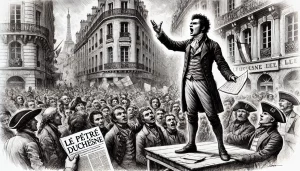The Fiery Pen of Jacques-René Hébert: Journalism in the French Revolution
 In the early 1790s, the streets of Paris were alive with the fervour of revolution. Amid the chaos, a loud and passionate voice stood out, capturing the attention of the city’s working class. This was the voice of Jacques-René Hébert, revolutionary journalist whose newspaper, “Le Père Duchesne,” became a rallying cry for the common people.
In the early 1790s, the streets of Paris were alive with the fervour of revolution. Amid the chaos, a loud and passionate voice stood out, capturing the attention of the city’s working class. This was the voice of Jacques-René Hébert, revolutionary journalist whose newspaper, “Le Père Duchesne,” became a rallying cry for the common people.
Jacques-René Hébert wasn’t just a journalist; he was a revolutionary force. His publication, “Le Père Duchesne,” became the mouthpiece for the working class during the French Revolution. But how did one man’s words ignite such fervour? Let’s explore Hébert’s journey and his impact on one of history’s most tumultuous times.
Early Life and Career Beginnings
Jacques-René Hébert was born on November 15, 1757, in Alençon, France. Coming from a modest background, Hébert faced numerous hardships in his early life. He worked various clerical jobs, each one giving him a closer look at the struggles of the common people. It was these experiences that eventually led him to journalism, where he found his true calling.
Hébert’s early career was marked by a keen sense of justice and a desire to give a voice to the voiceless. His modest beginnings gave him a unique perspective on the struggles of the lower classes, fueling his later work as a journalist and revolutionary.
“Le Père Duchesne” and Voice of the Working Class
In 1790, Jacques-René Hébert, revolutionary journalist, launched “Le Père Duchesne,” a newspaper that quickly became popular among the sans-culottes, the working-class revolutionaries of Paris. Hébert’s articles were known for their raw, unfiltered language and direct criticism of the aristocracy and monarchy. His newspaper was not just a publication; it was a rallying cry for the oppressed.
“Le Père Duchesne” resonated with the working class because it spoke their language and addressed their grievances . Hébert’s fiery rhetoric and passionate advocacy for the people made him a beloved figure among the sans-culottes. He didn’t just report the news; he incited action and inspired change.
. Hébert’s fiery rhetoric and passionate advocacy for the people made him a beloved figure among the sans-culottes. He didn’t just report the news; he incited action and inspired change.
As Hébert wrote, “Citizens, awake! The time has come to fight for your rights and overthrow the tyrants!”
Did You Know
“Le Père Duchesne” translates to “Father Duchesne” in English. The name “Père Duchesne” was a fictional character created by Jacques-René Hébert, who embodied the archetypal, outspoken, and down-to-earth working-class man. Through this persona, Hébert used his newspaper to voice the frustrations and aspirations of the common people during the French Revolution, making the publication both relatable and influential among the sans-culottes.
Hébert’s Influence and Downfall
Hébert’s radical views and outspoken nature made him both a hero and a target. He played a key role in significant events like the storming of the Tuileries and the September Massacres. His influence was undeniable, and his words continued to rally the working class to action.
However, Hébert’s extremism eventually led to his downfall. His aggressive tactics and relentless attacks on his political opponents made him many enemies. In 1794, during the Reign of Terror, Hébert was arrested and executed by guillotine. His death marked the end of his tumultuous journey, but his impact on the Revolution remained.
In his final moments, Hébert proclaimed, “I die for the revolution, convinced that I have done everything for the liberty of the people.”
Jacques-René Hébert, revolutionary journalist, remains a controversial figure in history. His passionate advocacy for the working class and his fiery rhetoric left an indelible mark on the French Revolution. As historian Timothy Tackett once said, “Hébert’s voice was the raw cry of a people pushed to their limits, demanding change and justice.”
Find Out More!
- Book: “The Days of the French Revolution” by Christopher Hibbert – A vivid account of the Revolution’s key events and figures.
- Website: History.com – Comprehensive articles on the French Revolution.
- Documentary: “The French Revolution” – A History Channel documentary that delves into the lives of key revolutionaries, including Hébert.

0 Comments